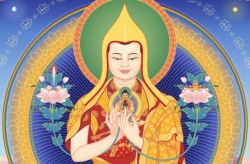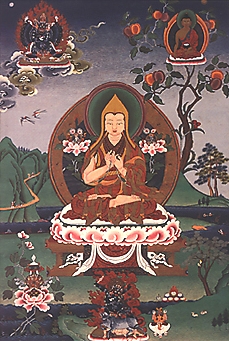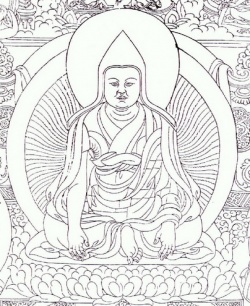Je Tsongkapa:Three Principal Paths
JE TSONGKAPA: THREE PRINCIPAL PATHS
[The complete root text of the Three Principal Paths (Lam-stzo rnam-gsum) by Je Tsongkapa (1357-1419)]
༄༅༎ རྗེ་བཏཟུན་ཆོས་ཀྱི་རྒྱལ་པོ་ཏཟོང་ཁ་པ་ཆེན་པོས་མཛད པའི་ལམ་གྱི་གཏཟོ་བོ་རྣམ་གསུམ་བཞུགས་སོ༎
Herein contained is the “Three Principal Paths” written by Tsongkapa the Great, King of the Dharma
༄༅༅༎ རྗེ་བཏཟུན་འཇམ་པའི་དབྱངས་ལ་ཕྱག་འཙལ་ལོ།
I bow to all the high and holy lamas.
།རྒྱལ་བའི་གསུང་རབ་ཀུན་གྱི་སྙིང་པོའི་དོན།
།རྒྱལ་སྲས་དམཔ་རྣམས་ཀྱི༌ཨིས་བསྔགས་པའི་ལམ།
།སྐལ་ལྡན་ཐར་འདོད་རྣམས༌ཀྱི་འཇུག་ངོགས་དེ།
།ཨྀཇི་ལྟར་ནུས་བཞིན་བདག་གིས་བཤད་པར་བྱ།
As far as I am able I’ll explain
The essence of all high teachings of the Victors,
The path that all their holy sons commend,
The entry point for the fortunate seeking freedom.
།གང་དག་སྲིད་པའི་བདེ་ལ་མ་ཆགས་ཤིང།
།དལ་འབྱོར་དོན་ཡོད་བྱ་ཕྱིར་བརྟཟོན་པ་ཡིས།
།རྒྱལ་བ་དགྱེས་པའི་ལམ་ལ་ཡིད་རྟོན་པའི།
།སྐལ་ལྡན་དེ་དག་དབ༹ང་བའི་ཡིད་ཀྱིས་ཉོན།
Listen with a pure mind, fortunate ones
Who have no craving for the pleasures of life,
And who, to make leisure and fortune meaningful, strive
To turn their minds to the path which pleases the Victors.
།རྣམ་དག་ངེས་འབྱུང་མེད་པར་སྲིད་མཙོ་ཡི།
།བདེ་འབྲས་དོན་གཉེར་ཞི་བའི་ཐབས་མེད་ལ།
།སྲིད་ལ་བརྐམ་པ་ཡསཀྱང་ལུས་ཅན་རྣམས།
།ཀུན་ནས་འཆིང་ཕྱིར་ཐོག་མར་ངེས་འབྱུང་བཏཟལ།
There’s no way to end, without pure renunciation,
This striving for pleasant results in the ocean of life.
It’s because of their hankering life as well that beings
Are fettered, so seek renunciation first.
།དལ་འབྱོར་རྙེད་དཀའ་ཙེ་ལ་ལོང་མེད་པ།
།ཡིད་ལ་གོམས་པས་ཙེ་འདིའི་སྣང་ཤས་ལོག།
།ལས་འབྲས་མི་བསླུ་འཁོར་བའི་སྡུག་བསྔལ་རྣམས།
།ཡང་ཡང་བསམ་ན་ཕྱི་མའི་སྣང་ཤས།
Leisure and fortune are hard to find, life’s not long;
Think it constantly, stop desire for this life.
Think over and over how deeds and their fruits never fail,
And the cycle’s suffering: stop desire for the future.
།ལྡོག་དེ་ལྟར་གོམས་པས་འཁོར་བའི་ཕུན་ཙོགས་ལ།
།ཡིད་སྨོན་སྐད་ཅིག་ཏཟམ་ཡང་མི་སྐྱེ་ཞིང།
།ཉིན་མཙན་ཀུན་ཏུ་ཐར་པ་དོན་གཉེར་བློ།
།བྱུང་ན་དེ་ཙེ་ངེས་འབྱུང་སྐྱེས་པ་ལགས།
When you’ve meditated thus and feel not even
A moment’s wish for the goods things of cyclic life,
And when you begin to think both night and day
Of achieving freedom, you’ve found renunciation
།ངེས་འབྱུང་དེ་ཡང་རྣམ་དག་སེམས་བསྐྱེད་སྐྱིས།
།ཟིན་པ་མེད་ན་བླ་མེད་བྱང་ཆུབ་ཀྱི།
།ཕུན་ཙོགས་བདེ་བའི་རྒྱུ་རུ་མི་འགྱུར་བས།
།བློ་ལྡན་རྣམས་ཀྱིས་བྱང་ཆུབ་སེམས་མཆོག༌བསྐྱེད།
Renunciation though, can never bring
The total bliss of matchless Buddhahood
Unless it’s bound by the purest wish; and so,
The wise seek the high wish for enlightenment.
།ཤུགས་དྲག་ཆུ་བོ་བཞི་ཡི་རྒྱུན་གྱིས་ཁྱེར།
།ཟློག་དཀའ་ལས་ཀྱི་འཆིང་བ་དམ་པོས་བསྡམས།
།བདག་འཛིན་ལྕགས་ཀྱི་དྲ་བའི་སྦུབས་སུ་ཙུད།
།མ་རིག་མུན་པའི་སྨག་ཆེན་ཀུན་ནས་འཐིབས།
།མུ་མེད་སྲིད་པར་སྐྱེ་ཞིང་སྐྱེ་བ་རུ།
།སྡུག་བསྔལ་གསུམ་གྱིས་རྒྱུན་ཆད་མེད་པར་མནར།
།གནས་སྐབས་འདི་འདྲར་གྱུར་པའི་མ་རྣམས་ཀྱི།
།ངང་ཙུལ་བསམས་ནས་སེམས་མཆོག་བསྐྱེད་པར་མཛོད།
They’re swept along on four fierce river currents,
Chained up tight in past deeds, hard to undo,
Stuffed in a steel cage of grasping “self,”
Smothered in the pitchblack ignorance.
In a limitless round they’re born, and in their births
Are tortured by three sufferings without a break;
Think how your mothers feel, think of what’s happening
To them: try to develop this highest wish.
།གནས་ལུགས་རྟོགས་པའི་ཤེས་རབ་མི་ལྡན་ན།
།ངེས་འབྱུང་བྱང་ཆུབ་སེམས་ལ་གོམས་བྱས་ཀྱང།
།སྲིད་པའི་རྟཟ་བ་བཅད་པར་མི་ནུས་པས།
།དེ་ཕྱིར་རྟེན་འབྲེལ་རྟོགས་པའི་ཐབས་ལ་འབད།
You may master renunciation and the wish,
But unless you have the wisdom perceiving reality
You cannot cut the root of cyclic life.
Make efforts in ways then to perceive interdependence.
།གང་ཞིག་འཁོར་འདས་ཆོས་རྣམས་ཐམས་ཅད་ཀྱི།
།རྒྱུ་འབྲས་ནམ་ཡང་བསླུ་བ་མེད་མཐོང་ཞིང།
།དམིགས་པའི་གཏད་སོ་གང་ཡིན་ཀུན་ཞིག་པ།
།དེ་ནི་སངས་རྒྱས་དགྱེས་པའི་ལམ་ལ་ཞུགས།
A person’s entered the path that pleases the Buddhas
When for all objects, in the cycle or beyond,
He sees that cause and effect can never fail,
And when for him they lose all solid appearance.
།སྣང་བ་རྟེན་འབྲེལ་བསླུ་བ་མེད་པ་དང།
།སྟོང་པ་ཁས་ལེན་བྲལ་བའི་གོ་བ་གཉིས།
།ཇི་སྲིད་སོ་སོར་སྣང་བ་དེ་སྲིད་དུ།
།ད་དུང་ཐུབ་པའི་དགོངས་པ་རྟོགས་པ་མེད།
You’ve yet to realize the thought of the Able
As long as two ideas seem to you disparate:
The appearance of things – infallible interdependence;
And emptiness – beyond taking any position.
།ནམ་ཞིག་རེ་འཇོག་མེད་པར་ཅིག་ཅར་དུ།
།རྟེན་འབྲེལ་མི་བསླུར་མཐོང་བ་ཏཟམ་ཉིད་ནས།
།ངེས་ཤེས་ཡུལ་གྱི་འཛིན་སྟངས་ཀུན་འཇིག་ན།
།དེ་ཙེ་ལྟ་བའི་དཔྱད་པ་རྫོགས་པ་ལགས།
At some point they no longer alternate, come together;
Just seeing that interdependence never fails
Brings realization that destroys how you hold to objects,
And then your analysis with view is complete.
།གཞན་ཡང་སྣང་བས་ཡོད་མཐའ་སེལ་བ་དང།
།སྟོང་པས་མེད་མཐའ་སེལ་ཞིང་སྟོང་པ་ཉིད།
།རྒྱུ་དང་འབྲས་བུར་འཆར་བའི་ཙུལ་ཤེས་ན།
།མཐར་འཛིན་ལྟ་བའི་འཕྲོག་པར་མི་འགྱུར་རོ།
In addition, the appearance prevents the existence extreme;
Emptiness that of non-existence, and if
You see how emptiness shows in cause and effect
You’ll never be stolen off by extreme views.
།དེ་ལྟར་ལམ་གྱི་གཏཟོ་བོ་རྣམ་གསུམ་གྱི།
།གནད་རྣམས་རང་གི་ཇི་བཞིན་རྟོགས་པའི་ཙེ།
།དབེན་པ་བསྟེན་ཏེ་བརྟཟོན་འགྲུས་སྟོབས་བསྐྱེད་ནས།
།གཏན་གྱི་མདུན་མ་མྱུར་དུ་སྒྲུབས་ཤིག་བུ།
When you’ve grasped as well as I the essential points
Of each of the three principal paths explained,
Then go into isolation, my son, make mighty
Efforts, and quickly win your ultimate wish.
ཞེས་པ་འདི་ནི་མང་དུ་ཐོས་པའི་དགེ་སློང་བློ་བཟང་གྲགས༌པའི་དཔལ་གྱིས་ཙ་ཁོ་དབོན་པོ་ངག་དབང་གྲགས་པ་ལ་གདམས༌པའོ༎
These instructions were imparted to Ngawang Drakpa, a friar from the Tsako district, by that very learned Buddhist monk, the glorious Lobsang Drakpa.
Like
Be the first to like this.


